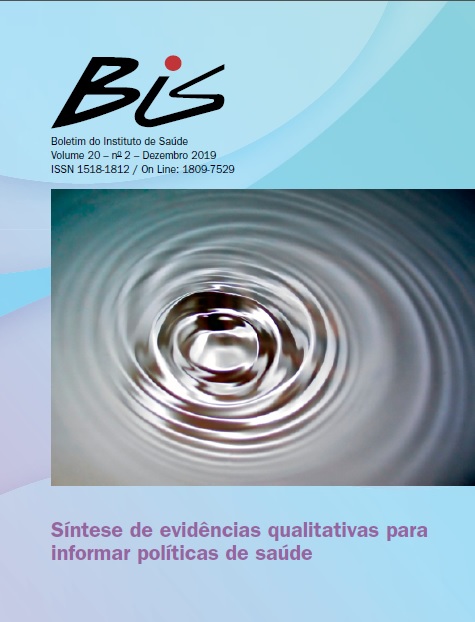Abstract
The objective of this study was to synthesize evidence related to the motivations, thoughts, and suicidal ideation experiences among Brazilian adolescents. The search was performed in ME-DLINE, EMBASE, LILACS, PsycINFO, Google Scholar e Google. The articles selection, data extraction and methodological quality eva-luation were performed by two independent researchers. Of 3.496 identified articles, four studies were included. The main motiva-tions for suicidal ideation were fragile bonds, depression, and lack of affection. The predominant feelings were loneliness, sadness, helplessness, and hopelessness. Thoughts related to the belief that one is alone in the world and to not seeing a solution to one’s sufferings and conflicts have been reported as related. Suicidal ideation may be an important phenomenon among Brazilian ado-lescents, requiring society’s attention, especially by academics and the government, to expand the base of qualitative evidence and discussion of preventative public policy for suicide.
References
2. Ministério da Saúde (BR). Boletim Epidemiológi-co. Suicídio: saber, agir e prevenir [internet]. 2017 [acesso em 11 abr 2019]; 48(30):15. Disponível em: http://portalarquivos2.saude.gov.br/images/pdf/2017/setembro/21/2017-025-Perfil-epidemiologico-das-tenta-tivas-e-obitos-por-suicidio-no-Brasil-e-a-rede-de-atencao-a-saude.pdf.
3. Ministério da Saúde (BR). Setembro Amarelo - Agenda Es-tratégica de Prevenção do Suicídio. [internet]. 2017 [aces-so em 11 abr 2019]. Disponível em: http://portalarquivos. saude.gov.br/images/pdf/2017/setembro/21/Coletiva-sui-cidio-21-09.pdf.
4. Abdala-Filho E, Chalub M, Telles LEB. Psiquiatria Forense de Taborda. 3. ed. Porto Alegre: Artmed; 2016.
5. Carlson GA, Cantwell DP. Suicidal Behavior and Depres-sion in Children and Adolescents. J Am Acad Child Psychia-try [internet]. 1982 [acesso em 11 abr 2019]; 21(4):361–8. Disponível em: https://www.sciencedirect.com/science/article/pii/S0002713809609390.
6. Ruiloba JV. Introducción a la Psicopatologia y la psiquia-tria. Barcelona: Elsevier; 2011.
7. Barrios LC, Everett SA, Simon TR, Brener ND. Suicide ide-ation among US college students associations with other in-jury risk behaviors. J Am Coll Health Assoc. [internet]. 2000 [acesso em 11 abr 2019]; 48(5):229–33. Disponível em: http://www.ncbi.nlm.nih.gov/pubmed/10778023.
8. Assis SG de, Gomes R, Pires T de O. Adolescence, sexu-al behavior and risk factors to health. Rev. Saude Publica. 2014; 48(1):43–51.
9. Taylor B, Henshall C, Kenyon S, Litchfield I, Greenfield S. Can rapid approaches to qualitative analysis deliver ti-mely, valid findings to clinical leaders? A mixed methods study comparing rapid and thematic analysis. BMJ Open [internet]. 2018 [acesso em 9 ago 2019]; 8(10):1-13. Disponível em: https://bmjopen.bmj.com/content/8/10/e019993#article-bottom.
10. Moher D, Liberati A, Tetzlaff J, Altman DG, Altman D, An-tes G, et al. Preferred reporting items for systematic reviews and meta-analyses: The PRISMA statement. PLoS Medici-ne. 2009; 6(7):1-10.
11. Cooke A, Smith D, Booth A. Beyond PICO: the SPIDER tool for qualitative evidence synthesis. Qual Health Res [internet]. 2012 [acesso em 11 abr 2019]; 22(10):1435–43. Disponível em: http://journals.sagepub.com/doi/10.1177/1049732312452938.
12. Ouzzani M, Hammady H, Fedorowicz Z, Elmagarmid A. Rayyan-a web and mobile app for systematic reviews. Syst Rev [internet]. 2016 [acesso em 9 ago 2019]; 5:210. Disponível em: https://www.ncbi.nlm.nih.gov/pmc/articles/PMC5139140/.
13. Critical Appraisal Skills Programme. CASP Checklist: 10 questions to help you meke sense of a Qualitative research [Oxford]: CASP [internet]. 2018 [acesso em 9 ago 2019]. Dis-ponível em: http://www.casp-uk.net/casp-tools-checklists.
14. Zimmer L. Qualitative meta-syntesis: a question of dia-loguing with texts. 2006; 52(5):546-53.
15. Vieira LJE de S, Freitas MLV, Pordeus AMJ, Lira SVG, E Silva JG. “Amor não correspondido”: discursos de adoles-centes que tentaram suicídio. Cien Saude Colet [internet]. 2009 [acesso em 8 ago 2019]; 14(5):1825–34. Disponí-vel em: http://www.scielo.br/scielo.php?script=sci_arttext &pid=S1413-81232009000500024&lng=pt&tlng=pt.
16. Hildebrandt LM, Zart F, Leite MT. A tentativa de suicí-dio na percepção de adolescentes: um estudo descritivo. Rev Eletr. Enf [internet]. 2011 [acesso em 8 ago 2019]; 13(2):219–26. Disponível em: http://dx.doi.org/10.5216/ree.v13i2.8951.
17. Araújo LC, Vieira KFL, Coutinho MPL. Ideação suicida na adolescência : um enfoque psicossociológico no contexto do ensino médio. Psico-USF [internet]. 2010 [acesso em: 9 ago 2019]; 15(1):47–57. Disponível em: https://www.re-dalyc.org/articulo.oa?id=401036078006.
18. Amaral C, Pereira GB, Silva KL, Kuhn SM. Depressão na adolescência com ideação suicida: um estudo de caso. In: Anais da XI Mostra Científica do Cesuca [internet]. 2017 [acesso em: 9 ago 2019]; (11):199-214. Disponível em: http://ojs.cesuca.edu.br/index.php/mostrac/article/view/1342.
19. Dalgalarrondo P. Psicopatologia e semiologia dos trans-tornos mentais. Porto Alegre: Artmed; 2018.
20. Borges VR, Werlang BSG, Copatti M. Ideação suicida em adolescentes de 13 a 17 anos. Barbarói [internet]. 2008 [acesso em 9 ago 2019]; 28(1):109–23. Disponível em: https://online.unisc.br/seer/index.php/barbaroi/article/view/19219.
21. Botega NJ. Crise suicida: avaliação e manejo. Porto Ale-gre: Artmed; 2015.
22. Minayo MC de S, de Assis SG, de Souza ER, Correia BSC, Pacheco ML, Delgado, PGG. Suicídios no Brasil: Mor-talidade, Tentativas, Ideação, Comportamento Autopunitivo e Prevenção [internet]. 2010 [acesso em 9 ago 2019]. Dis-ponível em: https://docplayer.com.br/62783655-Suicidios-no-brasil-mortalidade-tentativas-ideacao-comportamento-autopunitivo-e-prevencao.html.
23. Silva VF da, Oliveira HB de, Botega NJ, Marín-León L, Barros MBA, Dalgalarrondo P. Fatores associados à ideação suicida na comunidade: um estudo de caso-controle. Cad Saude Publica. [internet]. 2006 [acesso em 12 abr 2019]; 22(9):1835–43. Disponível em: http://www.scielo.br/scie-lo.php?script=sci_arttext&pid=S0102-311X20060009000 14&lng=pt&tlng=pt.
24. Abed A. O desenvolvimento das habilidades socioe-mocionais como caminho para aprendizagem e o suces-so escolar de alunos da educação básica. São Paulo: UNESCO; 2014.

This work is licensed under a Creative Commons Attribution 4.0 International License.
Copyright (c) 2019 Alex Sander Bachega, Sau Pereira Tavares de Oliveira, Andressa de Lucca, Bento Gabriel Valdes, Débora Dupas Gonçalves do Nascimento, Sandra Maria do Valle Leone de Oliveira, Jorge Otávio Maia Barreto
